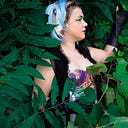Member-only story
What It’s Like to Hate Your Reflection
You may hate the way you look. But do you know what you look like?
I learned years ago to hate the way I look. I learned it from magazines, from fashion shows, from movies. I learned it from my peers. I learned that stringy, messy hair, acne, and any body fat whatsoever made one ugly, while small boobs, knobby knees, and large feet were also contributing factors.
A lot of people claim to hate the way they look. In a relatable scene in Mean Girls, the titular characters gather in front of the mirror and begin to list their flaws, while Cady learns all the things that can be wrong with a girl’s appearance. Whether the mean girls are legitimately concerned or it’s performance art is up for debate. And yet I suspect a lot of people who criticize their own appearance are looking at their flaws with relatively mild concern spurred by advertising effects. Teeth not white enough? Break out the whitening strips. Hair brassy? Grab that purple shampoo.
I apologize if I’m wrong and if many people legitimately hate the way they look. But I have to assume that they have an accurate idea of what they look like. Meanwhile, I actually loathe my reflection — and I don’t know what I look like.
I have a condition known as body dysmorphic disorder, in which my brain produces…
